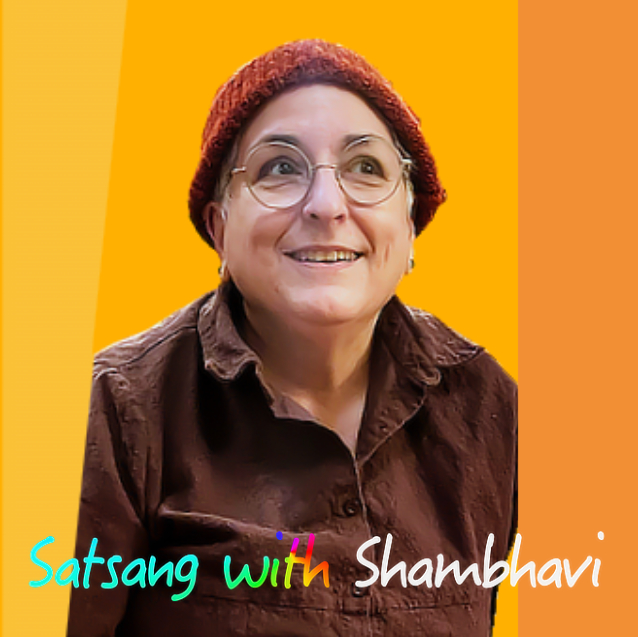Following a surprising series of dreams in 2018, Shambhavi decided to move Jaya Kula’s headquarters to the Bay Area. She talks about how holding strong expectations of ourselves, others, and spiritual life causes us to suffer. When we hold no expectations, we gain flexibility and the capacity to dance with changing circumstances. A podcast from Satsang with Shambhavi
SHAMBHAVI
So this trip really reminded me that everything of value that's ever happened to me has been something I didn't expect. And it reminded me that having expectations of life in general or spiritual practice is a great obstacle.
If we're looking for red, we either find red or we're disappointed that we don't find red. But there are a lot of other colors.
So while we're looking for red, we're not seeing everything else that's happening. And it's a recipe for suffering because life can do anything it wants, and very often it's not red.
So if we're always expecting red or wanting red, then two times out of eight we'll get red, but the other six times we won't. And this is a great cause of suffering.
Everything that we expect is more limited than what might actually happen.
We have expectations based on our karmas, on our limitations, period. Having expectations in and of itself is an expression of karma, of limited view.
So any expectation we have is going to be outrun by reality in some way or another. So in addition to us having limited expectations, the intelligence and compassion of reality is unlimited.
So even if things go wrong, if we don't have expectations, if we're simply working with circumstance or responding to circumstance, the result is always going to be better than any expectation, whether our expectations are met or unmet—if we simply proceed without expectations and work with what arises.
And I don't know why I've had so few expectations in my life, but I can say that the strongest expectation I've had, or the strongest sort of it should be like this kind of thing is the thing that caused me the most suffering.
So I've told the story many times before, but people should treat each other better. People should treat the world better—that has caused me a lot of suffering because people do what they do. And this species is obviously not caring for things as they should be cared for.
But I never had any expectation of spiritual life, mainly out of the sheer innocence of what to expect. I mean, I just didn't know enough about it to have any expectations [laughs] when I first started. And then for some reason I just never developed any.
But every single thing that has happened that I considered to be of value was completely unexpected.
Oh, there is one thing that I came to expect, and then when it was taken away for a period of time, I suffered. Since I was little I had these spectacular dreams, and they continued through into my beginning of practicing. And then they stopped for a number of years.
They just recently started up again, but I had a lot of attachment to those. I came to expect that every night when I laid my head down, maybe I wasn't going to have fantastically cosmic spiritual dreams, but they were going to be interesting and big. And I looked forward to going to sleep because I was going to have these dreams.
And then there were spectacular spiritual dreams and things that happened. My dream diaries from when I was younger, like, it's not just a dream—it's like there would be five of these dreams in one night and every single night that I would remember that would be interesting and often times having some meaning that was useful.
That one expectation, you know it took me years to get over that, to get over that expectation.
When we live with a lot of expectations—how things should be, how I should be, how spiritual life should go, what is supposed to be happening, who I am as a practitioner, and anything, what other people are supposed to do, how other people are supposed to behave or not behave. Not only does this cause us suffering, but it causes a great deal of inflexibility.
We are living in an improvisational world. Nothing is pre-planned. There are patterns, but there's not destiny, right? And there's no foregone conclusion that's absolutely guaranteed.
When we have these kind of expectations and very rigid ideas of things then we ourselves are rigid. When something happens, even a great opportunity that's contrary to our view of what we wanted to happen, and what we planned to happen, or what we thought should happen, then we have a hard time changing direction or adjusting.
We don't like to have to adjust to changing circumstances. And of course, if you're in this grand cosmic improvisational play and you don't like circumstances to change and you don't like having to adjust, you are in big trubs. [laughs]
If you always want a rule to follow and you want things to always go a certain way, you are in big trouble because that is simply not how reality operates.
So either you're going to live in this very brittle, rigid way, constantly trying to enforce your rules, or you're just going to suffer all the time. I mean, they're both suffering, but you're going to always feel anxious and destabilized because nothing is following along with you. It just doesn't work that way.
And when we live without expectations, we can be really flexible. When something changes, we can just go with it because we didn't have any expectations to begin with.
The only thing we can really expect is that if we lose—you know through doing sadhana we destroy some of these obscurations to our senses and our mind so that we can engage with the freshness of reality more—what we can expect is that it will be magical and interesting. That's about it, right? And I think that's a lot.
But many of us opt for some sort of fake safety rather than for magic and improvisation because we have these attachments to things being a certain way and people being a certain way and us achieving a certain thing.
Our death grip on these expectations causes tremendous staleness to enter into our life and makes us unable to adapt freely.
A lot of the freedom that we experience when we do destroy some of these obscurations is the freedom to adapt, the freedom to go along with life in a playful way, to adapt playfully, to not be anxious about every change that happens, to be able to feel what's happening and basically dance with it. That's a large part of the freedom that we experience.
I was really strongly reminded of that and also feeling some sense of—I have no idea why I had so few expectations. How did that happen? What a great thing, right?
And then that definitely allows you to just feel how you're being guided, how truly alive and intelligent everything is, and how you get responded to when you open.
When you do manage to get rid of some of these obscurations through your own diligence and courage and sincerity, I get reminded over and over again that doors just get flung open that you didn't even know were there.
Sign up to receive email updates
Enter your name and email address below and I'll send you periodic updates about the podcast.


